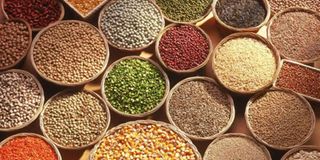Why Kenyan farmers are fighting for seed rights

What you need to know:
- In the olden days, sharing of indigenous seeds was a norm. In some communities like the Kamba, it was part of their culture –that a neighbour would harvest millet and share extra seeds for the next neighbour, and vice versa.
It is a few minutes to noon, and the sun is hammering down with immense, crushing heat. A handful of farmers donned in white shirts are standing outside the Machakos Law Courts. The corridors of justice are quiet, but the farmers outside are pregnant with anticipation. They are in huddles, catching up on the latest update about their case, and usual banter. Had the odds of the country’s laws favoured their plight as farmers, they’d probably be at their farms weeding out the overgrown weeds. Now, they have a hearing with Judge Rhoda Ruto.
But why are farmers in court?
In the olden days, sharing of indigenous seeds was a norm. In some communities like the Kamba, it was part of their culture –that a neighbour would harvest millet and share extra seeds for the next neighbour, and vice versa.
In 1972, a new law dubbed the Seed and Plant Varieties Act was enacted to help Kenya on issues to deal with seed transaction regulation, including their testing and certification, and to protect plant breeders' rights. It also set the basis of any seed related cases to be heard in a court of law.
In 2012, and later, 2016…the original law had some amendments, introducing new Acts of Parliament.
It is the 2016 Act that introduced regulations that dampened the spirit of traditional farmers in the country.
First, it established the Kenya Plant Health Inspectorate Service (Kephis), which became a key regulatory body for farmers. The Act also introduced new laws that prohibit farmers from selling, or sharing seeds and well as saving their seeds for the next harvest. The changes also introduced stricter certification requirements whereby farmers are supposed to register their seeds in a seed index. It costs about Sh75,000 for registration, and another Sh10, 000 annual fee.
The amendments were enforced to ensure that Kenya aligns with an international law dubbed the International Convention for the Protection of New Varieties of Plants (UPOV 1991).
Wambugu Wanjohi, an advocate of the High Court of Kenya working with the Law Society of Kenya, explainED that the amendments discriminate against small scale farmers.
“These provisions empower seed inspectors to go into farmers’ homes and cease seeds. That is arbitrary detention of property,” he explained.
About 15 farmers are petitioners to this case, but they were joined by many others, holding placards in solidarity.
When the judge walked in the room, it was jammed, with onlookers standing by the door. The lawyers presented the case on behalf of the farmers. After about 45 minutes of hearing from both sides, a decision was made that judgement will be pronounced on November 27.
“I am hopeful,” one farmer told Healthy Nation after the hearing.
Natural resources
Francis Ngiri had travelled from Nakuru to Machakos to hear firsthand the goings-on of the case. “I have been a farmer ever since I was born. I found my parents farming, and I learnt the craft from them. I have never looked back since.
“My understanding is that we should benefit from our natural resources, seeds being one of those. Barring me from selling, or exchanging seeds is an infringement to the Constitution,” he added.
Francis said the amendment of the law is contributing to loss of some of the indigenous seeds in the country.
“There are some indigenous seeds that it is our norm to share, and some are not easily found in the agrovets. They include banana seeds, sweet potato, arrow roots or amaranth. I have also noticed that we are losing some seeds, especially the African Night shade (managu), some types of pumpkin seeds and a type of black beans that is rich in iron,” he said.
At Francis’ farm in Nakuru, it is only his maize plants that have certified seeds as is required by the law.
“Our indigenous seeds are resilient to so many things including pests, diseases and even the changing weather patterns,” he explained.
Grace Mutava from Ol Donyo Sabuk is an organic farmer and is standing in solidarity with the petitioners.
“Our grandparents have used indigenous seeds for a long time, and they were a healthier generation compared to us. They could share seeds freely. That’s the essence of it because traditional seeds are not meant to be hidden, but to be shared.
“We are trying to bring back the lost seeds, that’s why we are here to fight for them to be back,” she added.
Elizabeth Atieno, a food campaigner with Greenpeace Africa, said people should care about the case because it boils down to the food we eat.
“Our government should support our farmers and protect our biodiversity. Agroecology will help us ensure that our food systems are resilient, and this has to start with farmers accessing quality indigenous seeds.
“This affects our food prices as well,” she added.
Daniel Wanjama from Seed Savers Network said that even though no one has been arrested so far, there is an impact already because the seed import for vegetable seeds has increased.
“This means that local people are not able to supply seeds because of the laws that we have. Criminalising seed saving means promoting hunger,” he said.
When Judge Rhoda made pronouncements on the judgement date, the farmers walked out of the courtroom silently, and their fate will be determined in six months.


